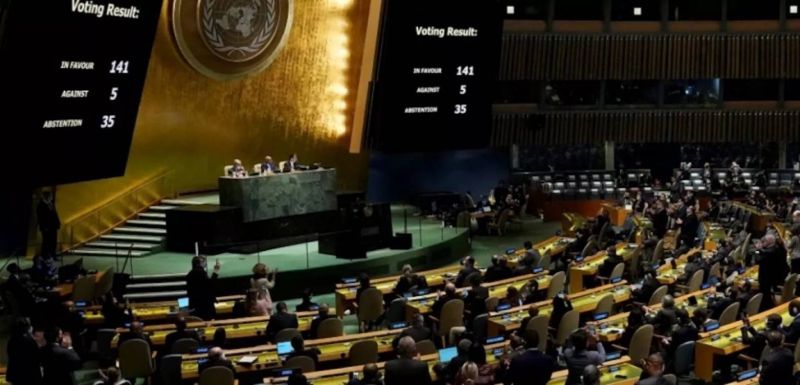
The UN General Assembly demanding an end to the war in Ukraine, in New York, March 2, 2022. (AFP )
Here we go again. Less than a week after the Foreign Ministry’s controversial statement denouncing the “Russian invasion of Ukraine,” Lebanon has once again sided with western capitals, and followed most Arab countries, in voting to diplomatically isolate Moscow at Wednesday evening’s United Nations General Assembly meeting.
The 193 member countries overwhelmingly adopted this non-binding resolution, calling on Russia to immediately stop the use of force against Ukraine. Five countries opposed the resolution, and 35 abstained from voting, including China.
A source close to Foreign Minister Abdallah Bou Habib, who is affiliated with the president’s camp, told L’Orient-Le Jour, “Lebanon’s position is not directed against anyone. We are simply committed to a peaceful resolution of conflicts.”
The source added that the decision to vote was taken after consultations between Prime Minister Najib Mikati, President Michel Aoun and the foreign minister.
On the sidelines of Wednesday’s tripartite meeting, Bou Habib had already set the tone for the decision a few hours before the UN vote, saying, “Lebanon maintains the same position as was announced on Feb. 24,” a reference to the [foreign ministry’s] first press release, which provoked an outcry and discord within the government, prompting even the president to distance himself from the statement.
So, why did Lebanon dig in its heels and maintain the same stance?
On the day of the vote, Aoun met with United States Ambassador Dorothy Shea and the US Under Secretary of State for Political Affairs, Victoria Nuland. Yet, Baabda denied any American pressure in this context.
“The subject of Ukraine was undoubtedly touched on during the meeting between the president and ambassador Shea, but it was a friendly discussion between the two, nothing more,” a source close to the presidency told L’Orient-Le Jour.
“Our sympathy for Ukraine comes rather from our own experience of invasions and occupation,” the source added.
Hezbollah’s silence
Lebanon’s decision to back the UNGA resolution has raised the ire of the Russians, however, according to L’Orient-Le Jour political journalist and columnist Mounir Rabih.
According to Rabih, Aoun’s adviser for Russian affairs Amal Abou Zeid is supposed to head to Moscow [Friday] to explain Lebanon’s position.
Russia’s Ambassador to Lebanon Alexander Rodakov had already expressed his displeasure after the statement from Bustros Palace, the seat of Lebanon’s foreign ministry, saying that these remarks “did not take into account the friendly relations that bind Lebanon and Russia.”
The Free Patriotic Movement denies that its support for the GA resolution would impact Lebanon’s cordial relations with the Kremlin.
“It’s not like there is only the FPM in Lebanon,” MP Alain Aoun said with some derision.
While the presidential camp seems to rule out the possibility of a diplomatic row with Moscow, could the disagreement degenerate into a fierce polemic at the local level?
For the moment, reactions seem under control. L’Orient-Le Jour tried reaching out to Rana Sahili, Hezbollah’s media manager, and Labor Minister Mustafa Bayram, known to be affiliated with the Iran-backed party, both of whom had castigated Wednesday’s press release, but they refused to comment on the recent Lebanese decision.
Last week, Bayram said Lebanon needs to “apply the principle of neutrality” to distance itself from conflicts.
According to Kassem Kassir, an analyst close to Hezbollah, the party “ is unhappy with the Foreign Ministry’s statement, but has yet to communicate anything for the moment concerning the UN vote.”
New differences have recently emerged between the presidential camp and Hezbollah, after the party’s MP Mohammad Raad implicitly criticized the president’s proposals for concessions on the maritime border demarcation with Israel.
For his part, Progressive Socialist Party leader Walid Joumblatt, known for his amicable relationship with Russia, told L’Orient-Le Jour that he “understands” the Lebanese decision to vote in favor of the UN resolution.
“Lebanon could, however, insist on implementing the Minsk agreement to stop the bloodshed,” the Druze leader said, referring to the peace proposal signed in February 2015, which put an end to the war that was raging in eastern Ukraine.
This proposition was the subject of an exchange of letters between Joumblatt and Ukraine’s Ambassador to Lebanon, Igor Ostash.
“On behalf of the PSP, I express my solidarity with the Ukrainian people who are the victims of this unjustified war,” Joumblatt wrote to Ostash.
This article was originally published in French in L’Orient-Le Jour.